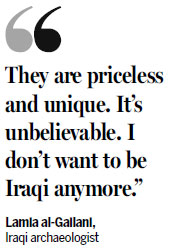IS militants take hammer to priceless old artifacts
By Agencies in Irbil and Baghdad (China Daily) Updated: 2015-02-28 08:07
Seen as symbols of idolatry, relics are smashed by extremists claiming requirement by Muhammad
Islamic State militants in northern Iraq have destroyed a priceless collection of statues and sculptures from the ancient Assyrian era, inflicting what an archaeologist described as incalculable damage to a piece of shared human history.
A video published by Islamic State extremists on Thursday showed men breaking up the artifacts, some of them identified as dating from the 7th century BC, with sledgehammers and drills, saying they were symbols of idolatry.
"The Prophet ordered us to get rid of statues and relics, and his companions did the same when they conquered countries after him," an unidentified man said in the video.
The smashed articles appeared to come from a museum in Mosul, the northern city that was overrun by IS last June, a former employee at the museum said.
The militants shoved stone statues off their plinths, shattering them on the floor, and one man applied an electric drill to a large winged bull. The video showed a large exhibition room strewed with dismembered statues, as Islamic songs played in the background.
Lamia al-Gailani, an Iraqi archaeologist and associate fellow at the London-based Institute of Archaeology, said the militants had wreaked untold damage. "It's not only Iraq's heritage, it's the whole world's," she said.
"They are priceless and unique. It's unbelievable. I don't want to be Iraqi anymore," she said, comparing the episode to the dynamiting of the Bamiyan Buddhas by the Afghan Taliban in 2001.
As well as Assyrian statues of winged bulls from the Mesopotamian cities of Nineveh and Nimrud, Gailani said the IS militants appeared to have destroyed statues from Hatra, a Hellenistic-Parthian city in northern Iraq dating back around 2,000 years.

Eleanor Robson, professor of Ancient Near Eastern History at University College London, also said on Twitter that statues from Hatra and Nineveh had been wrecked, though she added that some objects shown in the video were modern replicas.
UNESCO director general Irina Bokova said she had demanded an emergency meeting of the Security Council following the destruction in Mosul.
"This attack is far more than a cultural tragedy - this is also a security issue as it fuels sectarianism, violent extremism and conflict in Iraq," she said in a statement.
IS espouses a purist school of Sunni Islam, deeming many other Muslims to be heretics. Its fighters have destroyed Shiite and Sufi religious sites and attacked churches and other shrines in the parts of Syria and Iraq under their control.
Reuters - AFP - AP
(China Daily 02/28/2015 page11)






